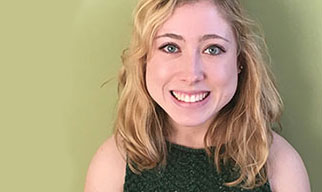Campus News
UCSC student wins second place at UC systemwide Grad Slam
Astronomy and astrophysics Ph.D. candidate Amanda Quirk came in second place in an elite group of ten competitors at the UC systemwide Grad Slam finale on May 6. She pulled off this feat after winning the UCSC Grad Slam in March.

Astronomy and astrophysics Ph.D. candidate Amanda Quirk came in second place in an elite group of ten competitors at the UC systemwide Grad Slam finale on May 6. She pulled off this impressive feat after winning the UCSC Grad Slam in March at the Kuumbwa jazz venue in downtown Santa Cruz, which came with a $3,000 prize.
The first-place competitor was UC Berkeley student Justin Lee, who gave a talk about an inhaled COVID-19 treatment.
At the finals, Quirk reprised her winning three-minute presentation in the finals, “The Tale of Two Galaxies: Studying How Galaxies Change Over Time.”
Hundreds of contestants took part in the Grad Slam events that were held in the spring at the 10 UC campuses.
Quirk celebrated her impressive showing this week.
“I mostly entered Grad Slam because I thought it would be fun,” Quirk said. “I am graduating this year and am proud of all I’ve learned and accomplished, and of the people I have gotten the opportunity to work with. Grad Slam seemed like an awesome way to show that while challenging myself to learn how to communicate my work in an accessible way, which is important to me.”
But Quirk also sees the serious purpose behind Grad Slam: giving contenders great experience in communicating complex topics to a general audience that may lack intensive scientific training.
“I personally think that communication is the most important job of a scientist,” Quirk said. “We could discover something really cool, but it would mean nothing if we couldn’t communicate it with anyone. I think scientists need to be able to tailor their explanations to their peers and to the general public. Both are just as important!
“Science benefits so much from the public being interested, from inspiring the next generation to getting funding from the government or private sources. Communication is a skill that takes practice. I have been able to practice it most while teaching, but Grad Slam offered a new, and almost extreme, way to learn more about how to communicate science.”
Next stop for Quirk is Columbia University, where she earned her B.A. in astrophysics in 2017. She will be a teaching postdoc in astronomy for the next three years.